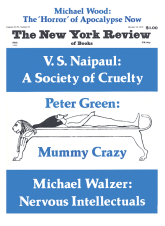To the Editors:
As former winners and judges of the National Book Awards, we should like to comment on the recent and ominous announcement by the Association of American Publishers of their revised book award program, henceforth to be known as The American Book Awards and administered by a new organization called The Academy of The American Book Awards (TABA).
Apart from the increase in the number of categories, which seems harmless in principle, the main purpose of the change appears to be to transfer decision-making from those who write books to those who sell and buy them.
In the past, the National Book Awards were made by a jury of the winners’ peers: novelists selected the winning novel, poets the volume of poems, historians the work of history, and so on. Over the years, this policy often resulted in the choice of books which had not been ballyhooed by large publishers and were not necessarily well known; the 1978 fiction and history winners, Tim O’Brien’s Going After Cacciato (Delacorte Press) and Richard Beale Davis’ Intellectual Life in the Colonial South, 1585-1760 (University of Tennessee Press) are only two of many examples. The selection of such titles over those with mammoth advertising budgets, paperback campaigns, and film sales has been extremely irritating to some people in the book business. At this year’s award festivities, the judges were several times approached by publishers and booksellers who expressed surprise and disgust at their neglect of various “more important” best-sellers.
Evidently, writers and critics are undependable types, who cannot be trusted to know that the best book is that which sells the most copies. The TABA program is designed to make sure that no more shockingly noncommercial choices are made in the future. This has been ensured in several ways. First, rather than asking the judges to make their selections from all books in their category published in a given year, as before, “titles will be submitted by publishers for consideration as nominees…. A fee will be charged for each title submitted.” The publicity release coyly does not say what this fee is, but presumably it will be high enough to discourage many publishers from submitting their less commercial titles, and perhaps to discourage some small presses from submitting any titles at all.
Second, rather than asking a panel of writers and critics to nominate the five finalists in each category, nominations will be made by “committees” which will “represent the Academy membership and will also include individuals or representatives of groups having special expertise in those catgories.” And the Academy membership, we read, “is divided into four general groups: (1) publishers, (2) booksellers and distributors, (3) librarians, and (4) authors and critics.” It is not by chance that the groups are listed in this order, with publishers in first place and writers last; merely another sign that businessmen and businesswomen intend to dominate the selection committees.
Once the five finalists have been chosen, the winner will be picked by a vote of the members of TABA. Each of the four groups listed above “will have 500 votes to be distributed in a representative manner among its membership. There will also be a small number of votes accorded to member organizations who don’t fall naturally into any of the four groups.” In other words, when it comes to picking the winners, writers and critics will have fewer than one vote in four.
To make absolutely sure that they get what they want, a Board of Directors, consisting of nine publishing executives and a representative from the American Booksellers Association, will oversee the whole process. And they will get what they want, as long as those of us who write books rather than market them stand around and let this distinguished literary award be transformed into a rubber-stamp prize for best-sellers.
We therefore ask all serious writers and critics to join with us in boycotting the TABA program. Those of us whose books are eligible for one of the award categories for 1980 will refuse to let their publishers submit them; and those who are asked to serve as token or hostage members of the selection committees will decline the invitation.
Nelson Algren, Michael Arlen, Donald Barthelme, Saul Bellow, Elizabeth Bishop, Vance Bourjaily, Karen Brazell, Olga Carlisle, John Clive, Malcolm Cowley, Douglas Day, Robert Fitzgerald, William Gaddis, William Gass, Andrew Hacker, Donald Hall, Elizabeth Hardwick, Anthony Hecht, John Hollander, Irving Howe, Elizabeth Janeway, Michael Kammen, Justin Kaplan, Alfred Kazin, Robert Kirsch, Harry Levin, Alison Lurie, Bernard Malamud, Peter Matthiessen, James Merrill, Nancy Milford, Arthur Mizener, Howard Nemerov, Joyce Carol Oates, Tim O’Brien, Walker Percy, Richard Poirier, Saunders Redding, Philip Roth, Mary Lee Settle, Roger Shattuck, Susan Sontag, Wallace Stegner, William Styron, Peter Taylor, Richard Wilbur.
This Issue
October 11, 1979



